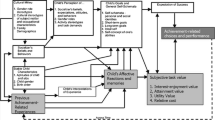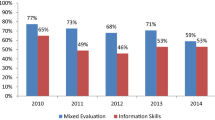Abstract
New national science standards have elevated attention to student performance with a core set of science and engineering practices, yet guidance about how to assess these practices is only just emerging in the literature. This is particularly true for the set of engineering design–focused concepts and practices articulated in the Next Generation Science Standards’ (NGSS) Engineering, Technology, and Application of Science (ETS) standards. In this work, we present a model of student cognition for assessing student facility with the engineering design practice of optimization. We operationalize this model of cognition within a set of engineering-focused units for middle school, framed as Virtual Engineering Internships (VEIs). To operationalize the engineering design practice of optimization within our VEIs, we first broke optimization down into two more specific sub-behaviors: exploration and systematicity. We then designed metrics that provide evidence of those behaviors and would be observable given student clickstream data from a digital design tool. We normalized these metrics based on the obtained distributions from a research trial. We discuss the existing correlations between these behaviors and metrics.





Similar content being viewed by others
References
Apedoe, X., & Schunn, C. D. (2013). Strategies for success: uncovering what makes students successful in design and learning. Instructional Science, 41(4), 773–791.
Baxter, G. P., Elder, A. D., & Glaser, R. (1996). Knowledge-based cognition and performance assessment in the science classroom. Educational Psychologist, 31(2), 133–140.
Bennett, R. E., Persky, H., Weiss, A., & Jenkins, F. (2010). Measuring problem solving with technology: a demonstration study for NAEP. The Journal of Technology, Learning and Assessment, 8(8).
Black, P., & Wiliam, D. (2010). Inside the black box: raising standards through classroom assessment. Phi Delta Kappan, 92(1), 81–90.
Brown, N. J. S., & Wilson, M. (2011). A model of cognition: the missing cornerstone of assessment. Educational Psychological Review, 23(2), 221–234.
Chan, J., Fu, K., Schunn, C. D., Cagan, J., Wood, K., & Kotovsky, K. (2011). On the benefits and pitfalls of analogies for innovative design: ideation performance based on analogical distance, commonness, and modality of examples. Journal of Mechanical Design, 133 081004-1-11.
Crismond, D. P., & Adams, R. S. (2012). The informed design teaching and learning matrix. Journal of Engineering Education, 101(4), 738–797.
DeBarger, A. H., Penuel, W. R., & Harris, C. J. (2013). Designing NGSS assessments to evaluate the efficacy of curriculum interventions. In Invitational Research Symposium on Science Assessment, Washington, DC. http://www.k12center.org/rsc/pdf/debarger-penuel-harris.pdf. Accessed 15 Aug 2019.
Doppelt, Y., Mehalik, M. M., Schunn, C. D., Silk, E., & Krysinski, D. (2008). Engagement and achievements: a case study of design-based learning in a science context. Journal of Technology Education, 19(2), 22–39.
Dubberly, H. (2004). How do you design? A compendium of models. http://www.dubberly.com/wp-content/uploads/2008/06/ddo_designprocess.pdf. .
Gobert, J., Sao Pedro, M., Raziuddin, J., & Baker, R. S. (2013). From log files to assessment metrics for science inquiry using educational data mining. The Journal of the Learning Sciences, 22(4), 521–563.
Hammond, K. J. (1989). Case-based planning: Viewing planning as a memory task. Academic Press.
Kolodner, J. (1993). Case-based reasoning. San Mateo: Morgan Kaufmann Publishers.
Kolodner, J. L., Camp, P. J., Crismond, D., Fasse, B., Gray, J., Holbrook, J., Puntambekar, S., & Ryan, M. (2003). Problem-based learning meets case-based reasoning in the middle-school science classroom: putting learning by design (tm) into practice. The Journal of the Learning Sciences, 12(4), 495–547.
Kruger, C., & Cross, N. (2006). Solution driven versus problem driven design: strategies and outcomes. Design Studies, 27(5), 527–548.
Kuo, C. Y., Wu, H. K., Jen, T. H., & Hsu, Y. S. (2015). Development and validation of a multimedia-based assessment of scientific inquiry abilities. International Journal of Science Education, 37(14), 2326–2357.
Marples, D. L. (1961). The decisions of engineering design. IRE Transactions on Engineering Management, 2, 55–71.
Mehalik, M., & Schunn, C. (2007). What constitutes good design? A review of empirical studies of design processes. International Journal of Engineering Education, 22(3), 519.
Mislevy, R. J., Steinberg, L. S., & Almond, R. G. (2003). On the structure of educational assessments. Measurement: Interdisciplinary Research and Perspectives, 1, 3–62.
National Research Council. (2001). Knowing what students know: The science and design of educational assessment. National Academies Press.
National Research Council. (2012). A framework for K-12 science education: Practices, crosscutting concepts, and core ideas. National Academies Press.
NGSS Lead States. (2013). Next generation science standards: For states, by states. Washington, DC: The National Academies Press.
Pellegrino, J. W., Wilson, M. R., Koenig, J. A., & Beatty, A. S. (2014). Developing assessments for the next generation science standards. National Academies Press.
Pellegrino, J. W., DiBello, L. V., & Goldman, S. R. (2016). A framework for conceptualizing and evaluating the validity of instructionally relevant assessments. Educational Psychologist, 51(1), 59–81.
Purzer, Ş., Goldstein, M. H., Adams, R. S., Xie, C., & Nourian, S. (2015). An exploratory study of informed engineering design behaviors associated with scientific explanations. International Journal of STEM Education, 2(1), 9.
Quellmalz, E. S., & Pellegrino, J. W. (2009). Technology and testing. Science, 323(5910), 75–79.
Quellmalz, E. S., Timms, M. J., Silberglitt, M. D., & Buckley, B. C. (2012). Science assessments for all: integrating science simulations into balanced state science assessment systems. Journal of Research in Science Teaching, 49(3), 363–393.
Ruiz-Primo, M. A., & Shavelson, R. J. (1996). Problems and issues in the use of concept maps in science assessment. Journal of Research in Science Teaching, 33(6), 569–600.
Schank, R. C. (1982). Dynamic memory: A theory of reminding and learning in computers and people. New York: Cambridge University Press.
Schank, R. C. (1999). Dynamic memory revisited. New York: Cambridge University Press.
Schauble, L., Klopfer, L. E., & Raghavan, K. (1991). Students’ transition from an engineering model to a science model of experimentation. Journal of Research in Science Teaching, 28(9), 859–882.
Serrano-Laguna, Á., Torrente, J., Moreno-Ger, P., & Fernández-Manjón, B. (2012). Tracing a little for big improvements: application of learning analytics and videogames for student assessment. Procedia Computer Science, 15, 203–209.
Shah, J. J., Vargas-Hernandez, N., & Smith, S. M. (2003). Metrics for measuring ideation effectiveness. Design Studies, 24(2), 111–134. https://doi.org/10.1016/S0142-694X(02)00034-0.
Shavelson, R. J., Baxter, G. P., & Pine, J. (1991). Performance assessment in science. Applied Measurement in Education, 4(4), 347–362.
Tempelaar, D. T., Rienties, B., & Giesbers, B. (2015). In search for the most informative data for feedback generation: learning analytics in a data-rich context. Computers in Human Behavior, 47, 157–167.
Vieira, C., Goldstein, M. H., Purzer, Ş., & Magana, A. J. (2016). Using learning analytics to characterize student experimentation strategies in the context of engineering design. Journal of Learning Analytics, 3(3), 291–317.
Vieira, C., Magana, A. J., & Purzer, S. (2017). Identifying engineering students’ design practices using process data. In Proceedings of 2017 research in engineering education symposium (REES). Bogotá-Colombia.
Wertheim, J., Osborne, J., Quinn, H., Pecheone, R., Schultz, S., Holthuis, N., & Martin, P. (2016). An analysis of existing science assessments and the implications for developing assessment tasks for the NGSS. https://snapgse.stanford.edu/sites/default/files/snap_landscape_analysis_of_assessments_for_ngss_0.pdf. Accessed 15 Aug 2019.
Xie, C., Zhang, Z., Nourian, S., Pallant, A., & Hazzard, E. (2014). Time series analysis method for assessing engineering design processes using a CAD tool. International Journal of Engineering Education, 30, 218–230.
Funding
This research is based upon work supported by the National Science Foundation under grant no. 1417939.
Author information
Authors and Affiliations
Corresponding author
Ethics declarations
Conflict of Interest
Samuel Crane provided data and assisted in the development of the digital tools used in this study, as part of his role as Director of Data Science at Amplify Education.
Ethical Approval
All procedures performed in studies involving human participants were in accordance with the ethical standards of the institutional and/or national research committee and with the 1964 Helsinki declaration and its later amendments or comparable ethical standards.
Informed Consent
Informed consent and parental consent were obtained from all individual participants included in the study.
Disclaimer
Any opinions, findings, and conclusions or recommendations expressed in this material are those of the authors and do not necessarily reflect the views of the National Science Foundation.
Additional information
Publisher’s Note
Springer Nature remains neutral with regard to jurisdictional claims in published maps and institutional affiliations.
Rights and permissions
About this article
Cite this article
Montgomery, R., Greenwald, E., Crane, S. et al. Operationalizing Optimization in a Middle School Virtual Engineering Internship. J Sci Educ Technol 29, 409–420 (2020). https://doi.org/10.1007/s10956-020-09826-8
Published:
Issue Date:
DOI: https://doi.org/10.1007/s10956-020-09826-8




